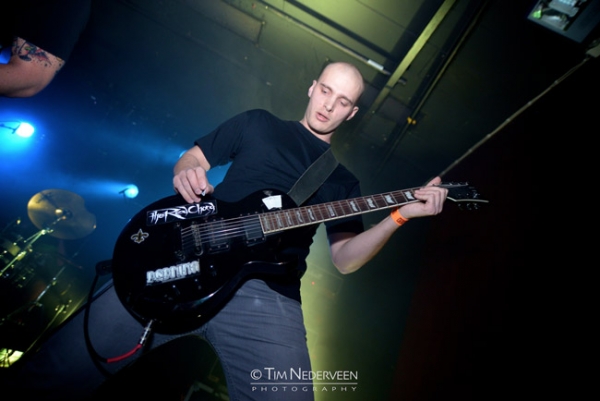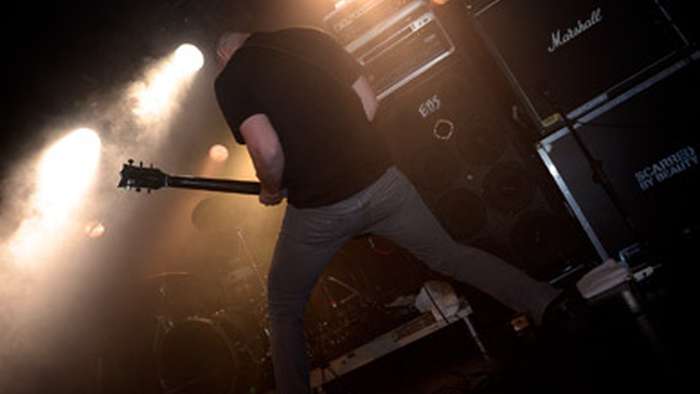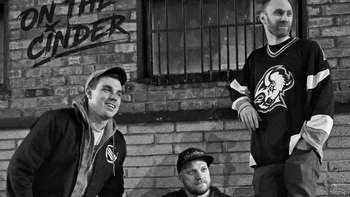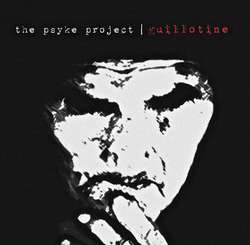The Psyke Project has been releasing since the early ‘00s. Samara, Daikini, Apnea, and Dead Storm gave way to the next logical step of their malicious plan and that is how Guillotine came to be, showing that this band could still surprise by conjuring some of their darkest moments yet.
Guitarist Mikkel Vadstrup Schmidt managed to find some time to answer our queries.
Scene Point Blank: Hi guys! First of all thanks for finding the time to do this interview it is really appreciated.
It has been almost four years since Dead Storm came out. If I remember correctly you were releasing albums every couple of years before, so why did Guillotine take more time?
Mikkel Vadstrup Schmidt: We actually did a split with As We Fight in between Dead Storm and Guillotine. But still, it took some time for us to get around to record Guillotine. I think the main reason is that we didn’t want to rush things and we also spend a fair amount of time on pinning down the sound and mood of the album.
Scene Point Blank: What is the overall feedback you got for the album and, looking back now, are you happy with the end result?
Mikkel Vadstrup Schmidt: We are really happy about how well the album has been received. It’s safe to say that all the guys in the band are really happy with how the album turned out. It’s always nice to have an end result that matches all of one’s expectations.
"It's hard not to go all misanthropic when thinking of how average people seemingly can commit the most heinous crimes under the right circumstances."
Scene Point Blank: Can you give us some insight on how your songwriting process works? Since your sound is quite diverse (it includes hardcore, sludge and black metal influences), does each member bring a part of the band to the table or is it more like a one-man job?
Mikkel Vadstrup Schmidt: Its mainly two guys in the band that bring along bits and pieces and we all put it together during rehearsals. Occasionally one of us brings a fully composed song but, often, the best results come from collaborations. I think it’s because we’re so much in tune as to our preferences that we work well together when writing new stuff. Usually we don’t consider which part of a song is sludge and which is black, it just has to do well together and then, afterwards, we might joke about the obvious genre references.
Scene Point Blank: Can you tell us a few more things about the production of the album? Where was it recorded, mixed and mastered? I personally think that this is the darkest, dirtiest and most heavy sound you ever had. Who engineered the album?
Mikkel Vadstrup Schmidt: Everything was done in Dead Rat studios in Århus by Jacob Bredahl. Basically we all agreed that dirty and heavy was the way to go since everybody felt that a sound like that would fit perfectly with the dark songs we were doing. To me it had this synergy effect when the gritty sounds of the amps and pedals came together with all the dark songwriting. Jacob knew exactly how to achieve the sounds we wanted, so we actually nailed the guitar, bass and drums setups in two days.
Scene Point Blank: Could you also elaborate a bit further on the lyrical concept of the album? I guess that “Hell Is Other People” refers to the famous Jean-Paul Sartre quote (from “No Exit.)”
Mikkel Vadstrup Schmidt: Yes, it does. It’s a powerful quote that describes man as being prone to indifference and violence. It’s hard not to go all misanthropic when thinking of how average people seemingly can commit the most heinous crimes under the right circumstances. Generally the lyrical concept revolves around struggling with the human condition in the sense of empathy vs. indifference towards suffering.
The book Ordinary Men by Christopher R. Browning describes how a group of soldiers murdered Jews during the Second World War. These men were too old for the front and were assigned to conduct mass executions in occupied territory. The well-founded conclusion of the book states that the main reason why they murdered women and children was the group pressure within the unit. Very few of the soldiers were members of the Nazi party and their commander allowed anyone who didn’t want to participate to be reassigned. Examples like this inspired the lyrics. It’s a bit of a paradox to have such misanthropic lyrics and at the same time accuse man of being basically evil and callous. To me the lyrics are the logical outcome of thinking about these things for too long.

Scene Point Blank: On a different note: in all your albums the main theme of the artwork seem to be quite consistent with the creepy personas on the cover, apart from Dead Storm. But in Guillotine you returned to the more disturbing artwork. Was that done on purpose?
Mikkel Vadstrup Schmidt: To me the face on the album cover is the incarnation of the vile nature of man. A demonic icon, I think. It’s actually not on purpose that we have creepy personas on most of our covers. I don’t’ know why, but having these characters on the covers made sense to us most of the time.
Scene Point Blank: Why was Guillotine released under no less than six labels?
Mikkel Vadstrup Schmidt: We just wanted to try a different approach. This way we could get our music out in many territories and all the labels were happy about sharing the workload. None of the labels are huge enterprises with business plans and lawyers penning down contracts, they are people with a strong DIY attitude like us. When you think like that you don’t feel that anybody is stepping on your toes when the common goal is to distribute the music.
Scene Point Blank: The music industry is undergoing some drastic changes. You are one of the bands that have a strong DIY attitude. What advice would you give to an underground band that is starting out?
Mikkel Vadstrup Schmidt: Hopefully one or two of the guys in the band have the energy and motivation to constantly work on getting gigs and setting up shows for the band. And it really doesn’t hurt to do some finance managing. Think hard about what you can push before you print thousands of CDs and t-shirts with prints that don’t mean anything to people. No one plays this kind of music for the money but I’ve seen quite a few bands that are limited because of debt.
Scene Point Blank: So playing with The Psyke Project alone does not cover the bills? Do all of you guys also have regular jobs on the side?
Mikkel Vadstrup Schmidt: Yes we do. We’ve got two guys working with physically and mentally disabled people, one guy is managing a festival that promotes volunteer work. Another one is making music and promotional videos and we even have our own paramedic.
Scene Point Blank: What does the future holds for The Psyke Project? I know it is quite early to ask but are you working on any new material?
Mikkel Vadstrup Schmidt: Maybe we’ll do another album with a different lineup. Many of us have been in this band for well over 10 years and some of us want to try something different. But we’re still spitting out riffs and hopefully most of us will remain together and put out a new record.
Scene Point Blank: Do you have any future gigs planned?
Mikkel Vadstrup Schmidt: Yes, we’re actually flying out to Iceland for the Eisnaflug festival next week. Can’t wait to go up there! We’ve got some shows planned in Germany and Holland too, so check our Facebook for updates.
Scene Point Blank: I am not going to be cruel and ask you for your all-time favorite albums. Instead what albums are you enjoying listening to lately?
Mikkel Vadstrup Schmidt: When it comes to noisy metal I still enjoy Shora’s Shaping the Random. Their first couple of records are amazing and I can’t believe how little attention they are getting. Even though I’m a big fan of noise I need a healthy dose of Bon Iver now and then. [He’s a] really gifted guy/band.







